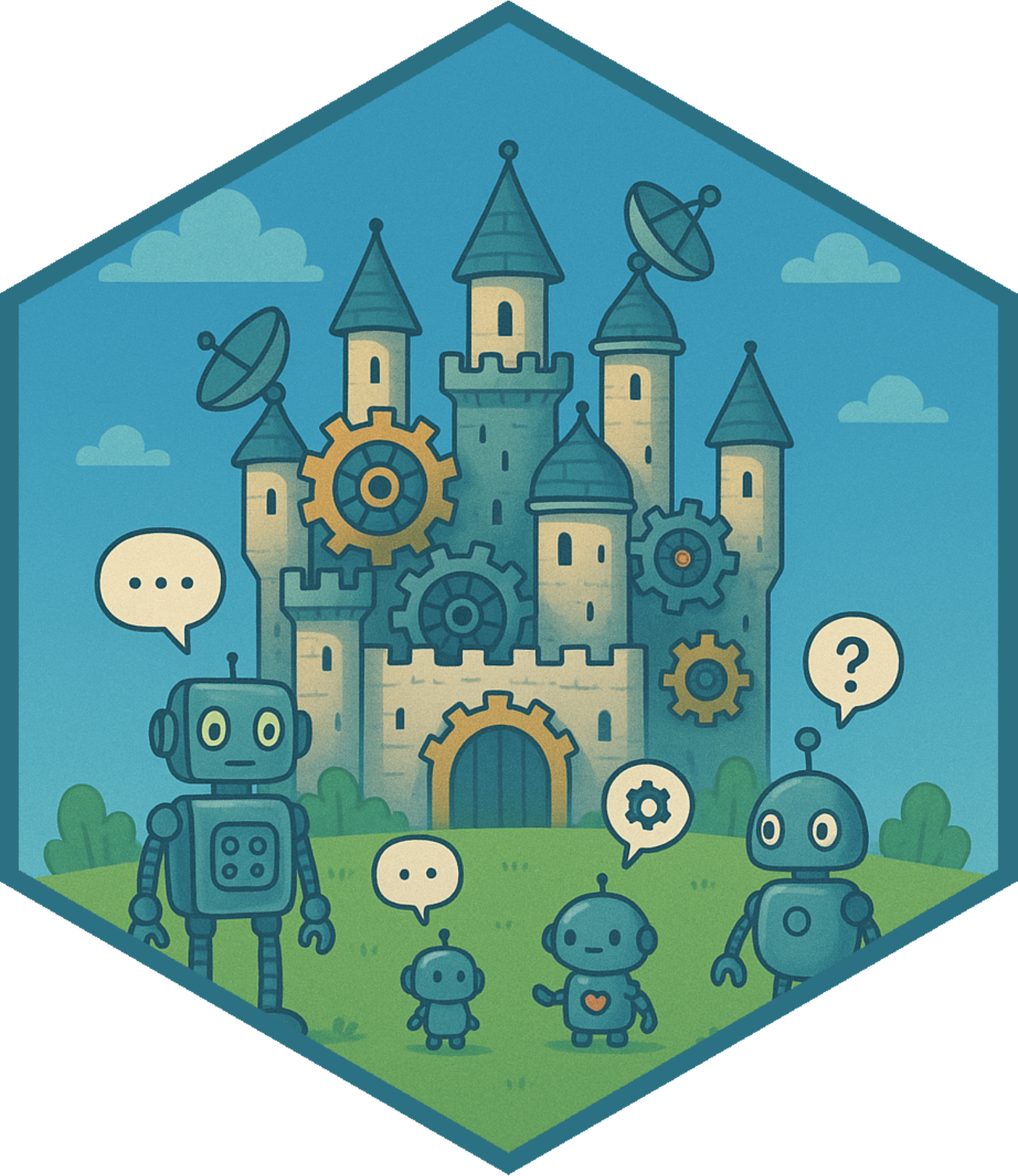chatalot synchronously processes a lot of large language model chats in R using ellmer.
Easily setup sequential and parallel processing workflows with features including tool calling, structured data extraction, save and resume, sound notifications, and more.
chatalot is similar to existing ellmer tools:
ellmer::parallel_chat() - Synchronously processes a lot of chats in parallel. This tool is simple and fast but has limited features with no option to save data and resume if interrupted.
ellmer::batch_chat() - Asynchronously batch processes a lot of chats from select providers. This tool is about 50% cheaper if you wait up to 24 hours for a response.
Installation
You can install the development or CRAN version of the package with:
# pak::pak("dylanpieper/chatalot")
pak::pak("chatalot")Setup API Keys
API keys allow access to chat models and are stored as environmental variables. I recommend the usethis package to setup API keys in your .Renviron such as OPENAI_API_KEY=your-key:
usethis::edit_r_environ(scope = c("user", "project"))Basic Usage
For the following examples, define a chat object to reuse:
openai <- chat_openai(system_prompt = "Reply concisely, one sentence")Sequential Processing
Sequential processing requests one chat at a time. Sequential processing is slow but safe, because you can save each response, one at a time:
library(chatalot)
chat <- chat_sequential(openai)
prompts <- c(
"What roles do people have in a castle?",
"Why are castles needed?",
"When was the first castle built?",
"Where are most castles located?"
)
response <- chat$process(prompts)Access the responses:
response$texts()
#> [1] "In a castle, people served as rulers, warriors, administrators,
#> craftsmen, and servants who managed its defense, governance, and daily upkeep."
#>
#> [2] "Castles have historically been built for defense and power consolidation,
#> and today they serve as cultural landmarks that preserve our heritage
#> and attract tourism."
#>
#> [3] "There isn’t a definitive \"first castle,\" but the earliest structures
#> resembling castles emerged in medieval Europe around the 9th century."
#>
#> [4] "Most castles are located in Europe, particularly in historically
#> turbulent regions like the United Kingdom, France, and Germany." Parallel Processing
Parallel processing requests multiple chats at a time across multiple R processes using future:
chat <- chat_future(openai)It is fast but must be interrupted to collect and save the responses. That is why the chats are distributed across the processes in chunks (e.g., 10 prompts). Once a chunk is finished, the responses are saved to the disk. The default upper limit for number of workers is parallel::detectCores(). The default chunk_size is also parallel::detectCores(), and defines the number of prompts to process at a time.
For maximum processing speed, set chunk_size to the number of prompts:
response <- chat$process(
prompts,
chunk_size = length(prompts)
)If using length(prompts), be aware that data will not be saved to the disk until all chats are processed, risking data loss and additional cost.
Features
Tool Calling
Register and use tool calling to let the LLM use R functions:
weather <- data.frame(
city = c("Chicago", "New York", "Lisbon"),
raining = c("Heavy", "None", "Overcast"),
temperature = c("Cool", "Hot", "Warm"),
wind = c("Strong", "Weak", "Strong")
)
get_weather <- function(cities) weather[weather$city %in% cities, ]
chat$register_tool(tool(
get_weather,
"Report on weather conditions.",
cities = type_array("City names", type_string())
))
response <- chat$process(interpolate("Brief weather update for {{weather$city}}?"))
response$texts()
#> [1] "Chicago is experiencing heavy rain, cool temperatures, and strong winds."
#> [2] "New York is experiencing hot conditions with no rain and light winds."
#> [3] "In Lisbon, the weather is overcast with warm temperatures and strong winds."Structured Data Extraction
Extract structured data using type specifications:
prompts <- c(
"I go by Alex. 42 years on this planet and counting.",
"Pleased to meet you! I'm Jamal, age 27.",
"They call me Li Wei. Nineteen years young.",
"Fatima here. Just celebrated my 35th birthday last week.",
"The name's Robert - 51 years old and proud of it.",
"Kwame here - just hit the big 5-0 this year."
)
response <- chat$process(
prompts,
type = type_object(
name = type_string(),
age = type_number()
)
)
response$texts()
#> name age
#> 1 Alex 42
#> 2 Jamal 27
#> 3 Li Wei 19
#> 4 Fatima 35
#> 5 Robert 51
#> 6 Kwame 50Save and Resume
Progress is tracked in response$progress() and saved to an .rds file on the disk, which allows you to easily resume interrupted operations:
response <- chat$process(prompts, file = "chat.rds")If file is not defined, a temporary file will be created by default.
Sound Notifications
Toggle sound notifications on completion, interruption, and error:
response <- chat$process(prompts, beep = TRUE)Verbosity Options
By default, the chat echo is set to FALSE to show a progress bar. However, you can still configure echo by first setting progress to FALSE:
prompts <- c(
"What is R?",
"Explain base R versus tidyverse"
)
response <- chat$process(
prompts,
progress = FALSE,
echo = TRUE
)
#> R is a programming language and software environment used for
#> statistical computing and graphics.
#>
#> Base R consists of the core functionalities built into R,
#> while tidyverse is a collection of packages that offer a more
#> consistent, readable, and streamlined approach to data manipulation,
#> visualization, and analysis.Methods
-
progress(): Returns processing status -
texts(): Returns response texts in the same format as the input prompts (i.e., a list if prompts were provided as a list, or a character vector if prompts were provided as a vector). When atypeis provided, a list with one element for each prompt. Whentypeis an consistent object, returns a data frame with one row for each prompt, and one column for each property. -
chats(): Returns a list of chat objects
